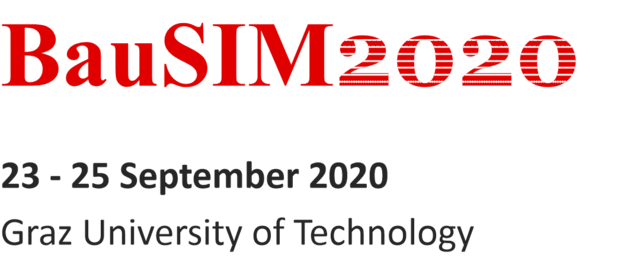Conference topics in detail
BIM-based planning tools and integration approaches
- Digital twins on building and neighborhood level and their importance for planning, construction and operation
- Data models and standards in the context of simulation
- BIM-based simulation and calculation tools
- Automated quality control of models
- Model and data visualisation based on virtual and augmented reality
- Interfaces and interoperability at the level of building and city information models
District - building - system – human
- Machine learning in the context of user behaviour and operation
- Interaction users - building - building services
- Incentive based systems for users (e.g. social gaming)
- Indoor climate, indoor air quality and indoor air movement
- Comfort (thermal, visual, auditory, olfactroy), physiology
- Noise control in buildings, neighborhoods and cities
- Microclimate on district level
- Regenerative, decentralised energy systems
- Active and functional facades
Lifecycle-oriented modelling and simulation of buildings and urban systems
- Tools for building and district simulation
- Hardware in the loop simulation
- Algorithms for computer based decision making
- Holistic balancing methods
Modelling of building physics on construction component level
- Heat and mass transport models
- Modeling and simulation of material systems and degradation processes
- Acoustics
- Building physics modelling and simulation on pore-scale
Numerical procedures, optimising and implementation
- Numerical methods for ODE and DAE (and their parallelisation)
- Numerical fluid mechanics (CFD) and heat and mass transfer
- Libraries for optimisation and parallelisation
- Dynamic coupling of simulation methods, co-simulation and model-exchange
- Interdisciplinary optimisation approaches
Product data and databases
- Data structures, formats, standards for databases
- Data availability, data quality
- Data acquisition, data archiving and processing
- Legal aspects - verifiability/traceability/replicability
Validation scenarios and quality management
- Sensor networks for model validation on component, building and districts level
- Parameterization, calibration and quality assessment of models
- Development of reference solutions for standards
- Data maintenance, long-time archiving methods of Solutions
Monitoring and optimising operation of buildings and urban systems
- IoT technologies for the energetic optimization of buildings, neighborhoods and cities
- Data management und analysis in monitoring projects
- Cloud based data management
- Communication of building services and energy supply infrastructure
- Optimisation of operation strategies
- Model-based control and operation
Teaching, training and further education in the field of simulation
Knowledge transfer into simulation practice and case studies

